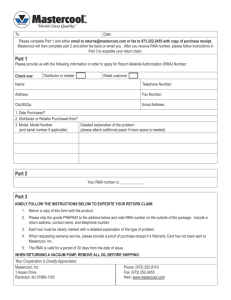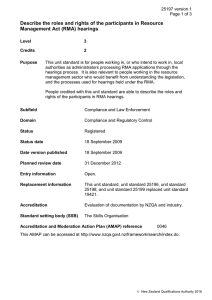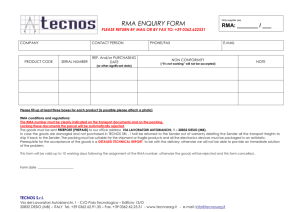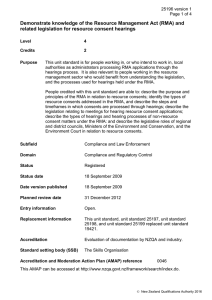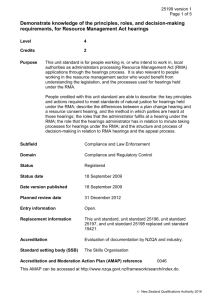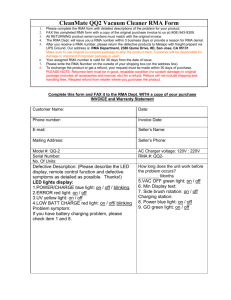Demonstrate knowledge of the preparation required for hearings under
advertisement
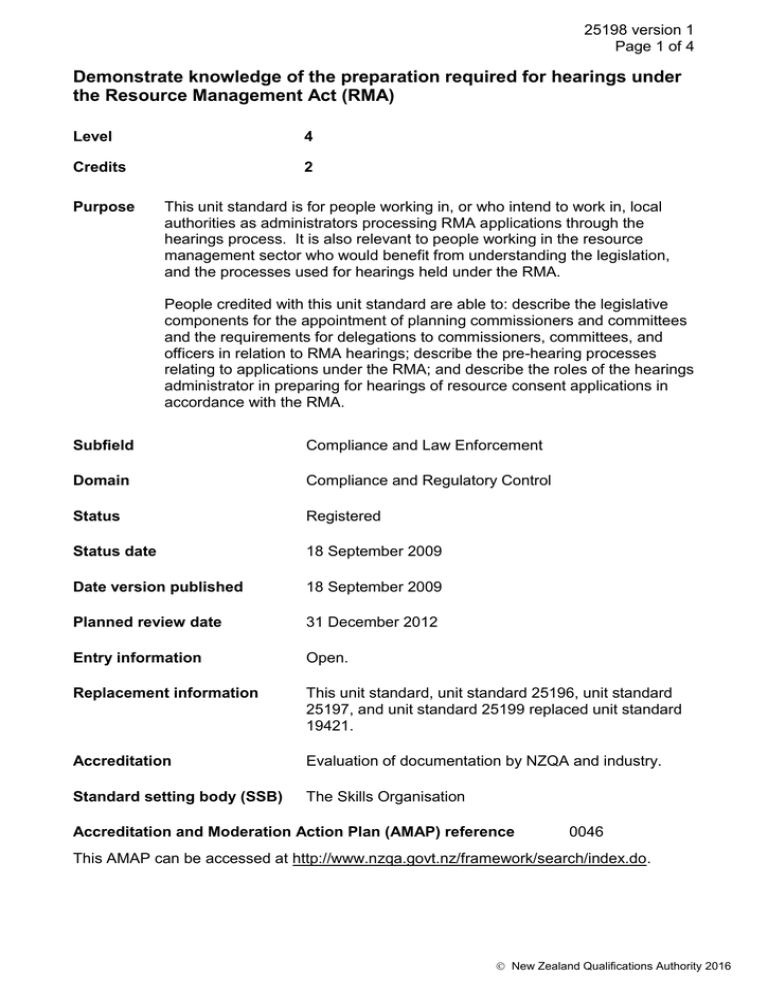
25198 version 1 Page 1 of 4 Demonstrate knowledge of the preparation required for hearings under the Resource Management Act (RMA) Level 4 Credits 2 Purpose This unit standard is for people working in, or who intend to work in, local authorities as administrators processing RMA applications through the hearings process. It is also relevant to people working in the resource management sector who would benefit from understanding the legislation, and the processes used for hearings held under the RMA. People credited with this unit standard are able to: describe the legislative components for the appointment of planning commissioners and committees and the requirements for delegations to commissioners, committees, and officers in relation to RMA hearings; describe the pre-hearing processes relating to applications under the RMA; and describe the roles of the hearings administrator in preparing for hearings of resource consent applications in accordance with the RMA. Subfield Compliance and Law Enforcement Domain Compliance and Regulatory Control Status Registered Status date 18 September 2009 Date version published 18 September 2009 Planned review date 31 December 2012 Entry information Open. Replacement information This unit standard, unit standard 25196, unit standard 25197, and unit standard 25199 replaced unit standard 19421. Accreditation Evaluation of documentation by NZQA and industry. Standard setting body (SSB) The Skills Organisation Accreditation and Moderation Action Plan (AMAP) reference 0046 This AMAP can be accessed at http://www.nzqa.govt.nz/framework/search/index.do. New Zealand Qualifications Authority 2016 25198 version 1 Page 2 of 4 Special notes 1 Legislation, regulations, and documentation Performance of the elements of this unit standard must comply with the following legislation, regulations, and documentation – District and Regional Plans; Commissions of Inquiry Act 1908; Local Government Act 2002; Local Government Official Information and Meetings Act 1987; Resource Management Act 1991, and Regulations and any subsequent amendments; and NZS 9202:2003 Model Standing Orders for Meetings of Local Authorities and Community Boards available at http://www.standards.co.nz. 2 The primary reference for this unit standard is An Everyday Guide to the Resource Management Act Series (Wellington: Ministry for the Environment, 2008). This is available at http://www.mfe.govt.nz/. This is a series of guides about everyday matters under the RMA. The following guides are relevant to this unit standard: 1.1 Getting in on the Act; 2.1 Applying for a Resource Consent; 3.3 Appearing at a Resource Consent Hearing; and 5.2 Appearing at a Council Plan or Plan Change Hearing. Elements and performance criteria Element 1 Describe the legislative components for the appointment of planning commissioners and committees and the requirements for delegations to commissioners, committees, and officers in relation to RMA hearings. Performance criteria 1.1 The description explains the statutory authority for councils to delegate hearings functions to commissioners, committees and officers in accordance with Sections 34 and 34A of the RMA and the primary reference. 1.2 The description explains the delegations that a regional or territorial authority requires to give effect to the statutory authority to delegate the authority to conduct hearings to commissioners, committees and officers under the RMA and Clauses 24-28 of Schedule 7 of the Local Government Act 2002. Element 2 Describe the pre-hearing processes relating to applications under the RMA. Performance criteria 2.1 The description explains the lodgement process for an application for consent in accordance with Section 88 of the RMA and the primary reference. 2.2 The description explains the requirements for decisions and actions as to whether an application should be notified or not, including limited and full notification in accordance with Sections 93 and 94 of the RMA, and the primary reference. New Zealand Qualifications Authority 2016 25198 version 1 Page 3 of 4 2.3 The description explains the submission processes including timeframes, late submissions, submission form, and withdrawal of submissions in accordance with Sections 93-98 of the RMA, and the primary reference. 2.4 The description explains the pre-hearing meeting process, the pre-provision of evidence process, and the mediation provisions in accordance with Sections 99 and 99A of the RMA, and the primary reference. 2.5 The description explains the provisions for waiver of time limits, extension of time limits, and the application of those waiver provisions, for processing applications in accordance with Section 37 of the RMA, and the primary reference. Element 3 Describe the roles of the hearings administrator in preparing for hearings of resource consent applications in accordance with the RMA. Performance criteria 3.1 The description explains the range of roles that the hearings administrator is responsible for in accordance with Section 101 of the RMA, Part 7 of the Local Government Official Information and Meetings Act, and Model Standing Orders, and the primary reference. Range 3.2 preparing for a hearing includes – setting the hearing date, notification of the hearing, logistics for the hearing, preparation and delivery of the hearing agenda, order of business, submitters’ speaking times, equipment and room layout. The description explains the role of the hearings administrator for arranging a site visit and the protocols that apply to site visits in accordance with the RMA, and the primary reference. Please note Providers must be accredited by NZQA, or an inter-institutional body with delegated authority for quality assurance, before they can report credits from assessment against unit standards or deliver courses of study leading to that assessment. Industry Training Organisations must be accredited by NZQA before they can register credits from assessment against unit standards. Accredited providers and Industry Training Organisations assessing against unit standards must engage with the moderation system that applies to those standards. Accreditation requirements and an outline of the moderation system that applies to this standard are outlined in the Accreditation and Moderation Action Plan (AMAP). The AMAP also includes useful information about special requirements for organisations wishing to develop education and training programmes, such as minimum qualifications for tutors and assessors, and special resource requirements. New Zealand Qualifications Authority 2016 25198 version 1 Page 4 of 4 Comments on this unit standard Please contact The Skills Organisation info@skills.org.nz if you wish to suggest changes to the content of this unit standard. New Zealand Qualifications Authority 2016
